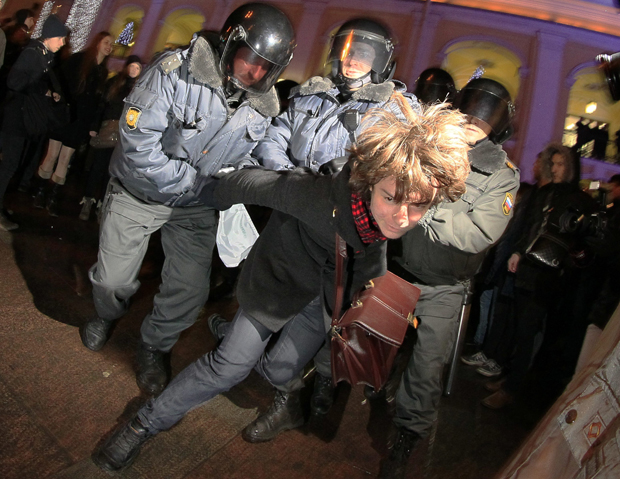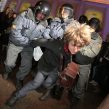
Authorities Move Troops and Hire Thugs to Suppress Pro-democracy Activists In Moscow
Publication: Eurasia Daily Monitor Volume: 8 Issue: 223
By:

The ruling United Russia (UR) lost votes in the December 4 Duma elections compared to the landslide in the previous national poll in December 2007, but official results still gave it a majority. After counting over 99.9 percent of the votes, the Central Election Commission (CEC) announced that UR received 49.3 percent and will be allocated 238 seats in the 450 member Duma. The communists will have 92 seats, Just Russia (JR) – 64, and the Liberal Democratic Party (LDPR) led by the flamboyant populist Vladimir Zhirinovsky – 56. The liberal Yabloko party gained only 3.43 percent of the vote according to the CEC, and did not make it to the Duma (Interfax, December 6).
The UR secured a workable majority, allowing President Dmitry Medvedev and Prime Minister Vladimir Putin to declare victory (Interfax, December 5). The Russian constitution, written in 1993, specifically detracts all real power from the legislature to create a super concentration of power in the Kremlin. The Duma does not have the power to investigate the actions of the executive branch of government, to appoint or censure ministers. From 1993 to 2000 President Boris Yeltsin ruled Russia unimpeded by having no Duma majority. The opposition parties gained 212 seats in the Duma, but not all of them are indeed an “opposition.” JR is lead by an old-time Putin friend and supporter from St. Petersburg Sergei Mironov. The LDPR faction votes as Zhirinovsky orders, and in the 1990s the Kremlin could often retail his support. According to Yabloko leader, Grigory Yavlinsky, the JR and LDPR factions always vote together with pro-government UR on all important issues, while the communists support any defense spending hikes (Interfax, December 7).
The new Duma may continue as a rubberstamp parliament, but in any case the election has shaken the regime. The allegedly fraudulent elections were followed by street protests in Moscow, St. Petersburg and several other Russian cities. In Moscow, some 10,000 protesters gathered on December 5 – the biggest anti-government protest for at least a decade. Riot police reacted ruthlessly – by December 8, some 1,000 were arrested during three days of continued protests, dozens of journalists and protesters were badly beaten up and leading critics of the regime received prison sentences in hurriedly arranged court hearings. Anti-corruption campaigner and top blogger, Alexei Navalny, was arrested on December 5 and imprisoned for 15 days. Protests in St. Petersburg have also turned violent with hundreds of arrests (Interfax, December 7).
The arrest of vocal opposition figures and the extreme unprovoked police brutality has not stopped the public protest campaign. On December 10, a massive protest rally is planned in downtown Moscow near the Kremlin. More than 20,000 have already pledged to attend using Facebook and other social networks. Authorities threaten to use force to disperse the protesters, if more than 300 appear at the rally (www.newsru.com, December 7).
There was overwhelming evidence of widespread electoral fraud by the ruling UR party in previous years, though the people seemed to be content and politically passive, but the economy has fallen in 2008-2009 and failed to pick up. Government inefficiency and staggering levels of corruption have infuriated and disfranchised many Putin supporters that used the Duma election to post a protest vote against UR and now believe their vote was stolen. On December 6, thousands of Interior Troops of the Separate Motorized Special Forces Division (former Dzerzhinsky Division named after the founder of the CheKa-KGB) were deployed in downtown Moscow to backup the use of riot police by Russia’s worried rulers (Interfax, December 6).
Thousands of members of pro-Kremlin youth groups have been shipped in from around the country to Moscow as a counterweight to genuine popular dissent. One of the leaders of the FC Spartak Moscow fan movement told Jamestown on condition of anonymity, that he was offered by the pro-Kremlin demonstration organizers to be paid 3,000 rubles ($100) per day bonus for each soccer fan mustered to stand for the UR cause.
The state-controlled TV praises the Duma election as a triumph of democracy and ignores the continued protests in a bout of extreme political censorship, but the Russian Internet and printed newspapers are full of evidence of state-sponsored electoral fraud and ballot box stuffing. A Kremlin-financed polling service – Public Opinion Foundation –based of exit polls just after the December 4 election reported that in Moscow UR secured some 27.5 percent of the vote, while the official result is 46 percent (Vedomosti, December 6). The Public Opinion Foundation later withdrew its exit poll result declaring it was a statistical error (RIA Novosti, December 7).
A letter addressed to Putin from the Defense Minister, Anatoliy Serdyukov, dated December 5, was obtained by journalists and published, reporting that “95.5 percent of servicemen and family members voted in the Duma election and 80 percent of them for UR.” Serdyukov pointed out some of the “best bases,” where UR received up to 99.8 percent of the vote (Kommersant, December 7). With members of families there are some 1.5 million votes, controlled by the defense ministry.
Foreign observers from the OSCE and Council of Europe have concluded that the December 4 elections were undemocratic (Interfax, December 5). The deputy chief of the JR Duma faction Gennady Gudkov (former KGB Colonel) told journalists “the elections in Moscow were fully falsified” and “UR hardly took 25 percent of the vote nationwide” (Novye Izvestiya, December 6). Many more citizens agree that UR has lost the election and does not have a mandate to rule Russia. Former Soviet President Mikhail Gorbachev told reporters: “With each day more Russians disbelieve the official election results. By ignoring public opinion the authorities discredit themselves and destabilize the situation.” Gorbachev believes the elections must be annulled and a new one called (Interfax, December 7).
Of course, the Kremlin will instead use brute force to suppress a resistant populous. This will undermine the credibility not only of the UR party, but also Putin in his upcoming re-election to the Kremlin on March 4, 2012. By next summer, Putin’s regime may be considered illegitimate and resisted by the more vocal part of the population concentrated in Moscow, while the rest of Russia will continue to be politically inert – or non-aligned. Putin’s regime may begin to crumble and it is unclear if will it survive until 2013. Putin is surrounded by a band of cynical kleptocrats (the UR) that will mass defect as soon as his authority falters. A terrified world may again, like in 1991, see a nuclear superpower with an increasingly illegitimate government, ripped apart by violent social and political discontent.




